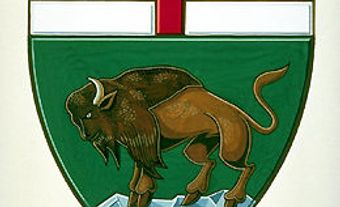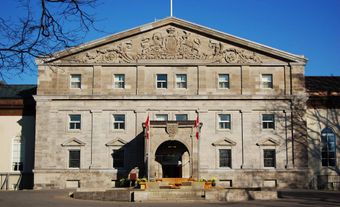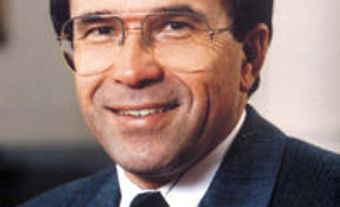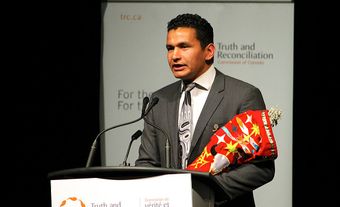Brian William Pallister, politician, Manitoba MLA 1992–97 and 2012–21, Member of Parliament 2000–08, premier of Manitoba 2016–21, teacher, financial consultant (born 6 July 1954 in Portage la Prairie, MB). A long-time figure in Canadian conservative politics, Brian Pallister served as a Manitoba MLA and Member of Parliament before becoming Manitoba's 22nd premier in May 2016. He resigned in August 2021 and has since retired from public life.

Early Life
Brian Pallister, the eldest of Bill and Anne Pallister’s three children, was raised on the third-generation family farm southwest of Portage la Prairie. His family's financial circumstances were modest. He later said this shaped his belief that governments must support less fortunate segments within society.
Pallister credits his mother, a teacher, with instilling a strong work ethic and a love of learning. At a young age he developed a love of mathematics, music and sports. At the age of 12 he was six feet tall (he grew to six-foot-eight as an adult). He excelled in softball, basketball and curling, all sports involving teamwork — a concept he has insisted is central to his leadership style. (Pallister was inducted into the Manitoba Softball Hall of Fame in 2004).
Pallister went to Brandon University, graduating in 1976 with a Bachelor of Arts and a Bachelor of Education. From 1976 to 1979, he worked as a high school teacher in Gladstone, Manitoba. He also served as a union representative for teachers.
Business
Throughout his early adult life, Brian Pallister took courses in insurance and financial planning. He eventually became a chartered financial consultant. Initially working out of his car, he founded the Pallister Financial Group in 1980. He sold the enterprise in 2013 to Hub International Limited, a leading global insurance brokerage.
Business success allowed Pallister, his wife Esther and their two daughters, Quinn and Shawn, to enjoy an affluent lifestyle. This includes a Winnipeg home worth several million dollars and a vacation property in Costa Rica. Criticized by some political opponents for his wealth, Pallister says his humble upbringing, and the hard work that brought him material success, have made him aware of the challenges faced by less fortunate families.

Provincial Politics
As a small businessman in the 1980s, Brian Pallister became active in his local chamber of commerce. In 1992, he entered Manitoba politics to protest high taxes and excessive regulation. He ran successfully that year as a Progressive Conservative (PC) in a by-election in Portage la Prairie.
Pallister was re-elected in the general election of 1995. He then became minister of government services in the Cabinet of Premier Gary Filmon. Pallister was instrumental in the passage of what was the strictest balanced budget law in the country. He also oversaw an extensive program of provincial government deregulation.
Federal Politics
In 1997, Brian Pallister resigned as minister and MLA in order to run as the PC candidate in that year's federal election, but he lost to the Reform Party incumbent. He then launched a bid for the leadership of the federal PCs, vowing to renew the splintered party by bringing back supporters who had moved to Reform. He finished fourth in the first ballot with 12.2 per cent of the vote. He soon withdrew from the race that would bring Joe Clark back to the PC leadership.
Pallister then focused his attention on the campaign to "unite the right" — merging the federal PC Party and the Canadian Alliance (the successor to Reform) — in the hopes of ending vote-splitting on the right of the political spectrum. This caused him to leave the PCs and join the Alliance.
In the 2000 federal election, he was elected as the Canadian Alliance (CA)Member of Parliament for Portage Lisgar. When the CA and the PC parties eventually merged in 2003, Pallister became a member of the resulting Conservative Party of Canada (CPC). He supported Stephen Harper as leader of the new party.
Pallister was re-elected as MP in 2004 and again in 2006, when the Conservatives under Harper formed a minority government. Contemplating a possible run for the vacant leadership of the PC Party of Manitoba, Pallister asked Harper not to consider him for a federal Cabinet post. He ended up not contesting the provincial leadership. Instead, in a surprise announcement in January 2008, he announced his departure from politics for personal reasons, although he remained an MP until the October federal election.
Manitoba PC Leader
Three years later, the Manitoba New Democratic Party (NDP) won its fourth consecutive majority government. This led to the resignation of PC Leader Hugh McFadyen. In April 2012, Pallister announced that he would seek the party leadership. He was acclaimed when no other candidates entered the race. Two months later, he won a by-election in Fort Whyte, an upscale Winnipeg constituency vacated by McFadyen.
As leader of the Opposition, Pallister focused on economic issues in criticizing the NDP government of Premier Greg Selinger. Manitoba was enjoying economic growth above the national average, but the government refused to reduce its deficits by cutting spending.
In 2013, Selinger broke his promise not to increase the provincial sales tax. At the same time, he bypassed the balanced budget law, which required that a referendum be held on any major tax increase. This led to a Cabinet revolt and a leadership contest that Selinger survived by a thin margin. (In 2019, toward the end of his first term as premier, Pallister would reverse this policy by bumping the sales tax back down from eight to seven per cent.)
The NDP government, however, did not survive the April 2016 general election. The result was a record victory for the PCs. They captured 40 of the 57 seats in the legislature to end 17 years of NDP rule in the province. The size of the PC majority, and its breakthroughs in previously hostile voter territory, were due in part to the election planning of Pallister and his team. This included well-targeted candidate recruitment, constituency memberships and fundraising.
First Term as Premier (2016–19)
In his 2016 campaign, Brian Pallister had emphasized economic growth, job creation, competitive taxes, balancing the budget, protecting front line services and integrity in government.
To demonstrate a commitment to austerity at the beginning of his first term, Pallister shrunk his Cabinet to just 12 ministers. Multiple reviews were also launched to identify potential budget savings. There were some layoffs of middle managers in the civil service and talk of possibly breaking collective agreements to restrain civil service wages and benefits (which comprised roughly 70 per cent of the provincial budget). In the two short sessions of the legislature held in 2016, the Pallister government faced relatively few obstacles. Both opposition parties were in the process of finding new leaders; the NDP was mired in internal disputes.
However, Pallister also garnered some negative press in his first term as premier because of time spent at his Costa Rica home. Some observers also criticized what they saw as his abrasive and confrontational style.
In June 2019, Pallister committed to work with the federal government on the National Housing Strategy. Winnipeg and Ottawa each committed to spend $225.4 million over the next decade to expand Manitoba’s housing stock (including its social housing), and to support needed updates and repairs to existing housing. In April 2021, Pallister significantly cut property taxes in the province, granting a 25 per cent rebate to farm owners and a 10 per cent rebate to other land holders. The opposition parties criticized the move as regressive. Then Manitoba Liberal leader Dougal Lamont stated, “It’s overwhelmingly geared to helping people… who don’t need help.” However, Pallister’s government also mandated a temporary freeze in rent increases.
Like other conservative premiers, Pallister opposed Prime Minister Justin Trudeau’s federal carbon tax policy, which called on the provinces to develop their own measures to help fight climate change. In November 2018, Pallister, Ontario premier Doug Ford, Alberta premier Jason Kenney, Saskatchewan premier Scott Moe and federal Conservative leader Andrew Scheer were pictured on the December cover of Maclean’s magazine as “The resistance.” The subtitle read: “A powerful new alliance of conservative leaders is taking a stand against the Liberals’ carbon tax plan. Welcome to Justin Trudeau’s worst nightmare.”
However, in January 2019 Trudeau’s government imposed a carbon tax in Manitoba, Ontario, Saskatchewan and New Brunswick because those provinces had not implemented their own carbon pricing plans. Claiming federal overreach and promising to introduce a provincial tax, Pallister’s government launched a lawsuit against the policy. The plan to introduce the provincial tax was shelved in 2020 when the COVID-19 pandemic hit. In March 2021, the Supreme Court ruled that the federal tax is constitutional. Similar challenges by the governments of Ontario and Saskatchewan were also unsuccessful.
Second Term as Premier (2019–21)
Brian Pallister went on to win another majority in the September 2019 election. However, his popularity later plummeted due to his government’s handling of the COVID-19 pandemic. Pallister faced serious criticism on more than one occasion for prematurely lifting pandemic restrictions. Pallister claimed that his policies had succeeded in delaying the third wave in spring 2021. But his critics, including new NDP leader Wab Kinew, insisted that he had ignored prior warnings from experts. By the end of the pandemic, Manitoba had the second-highest COVID-19 death rate in the country after Quebec.
Pallister was also criticized for what some saw as an insensitive attitude toward Indigenous people. During his first term, he had refused to apologize after referring to tensions between Indigenous and non-Indigenous hunters as a “race war.” In July 2021, statues of Queen Victoria and Queen Elizabeth II were torn down by a group of people memorializing the victims of residential schools. Pallister responded to the incident by saying, “we need to respect our heritage, just as we need to respect one another. Not to find fault… The people who came here to this country, before it was a country and since, didn’t come here to destroy anything. They came here to build. They came to build better.” The remarks were broadly criticized for being tone deaf and ahistorical. In response, Manitoba’s Indigenous relations minister Eileen Clarke resigned from her cabinet position.
With his approval ratings almost as low as 32 per cent — the lowest of any premier in Canada — Pallister resigned on 10 August 2021. He was succeeded by Heather Stefanson after a vote within the PC Party.
Life after Politics
Following his retirement from politics, Brian Pallister kept a low profile. He was known to spend time in Portage la Prairie, where he owns a ranch and an insurance company. But he largely vanished from public life in Manitoba.
(See also Politics in Manitoba; Premiers of Manitoba.)

 Share on Facebook
Share on Facebook Share on X
Share on X Share by Email
Share by Email Share on Google Classroom
Share on Google Classroom







